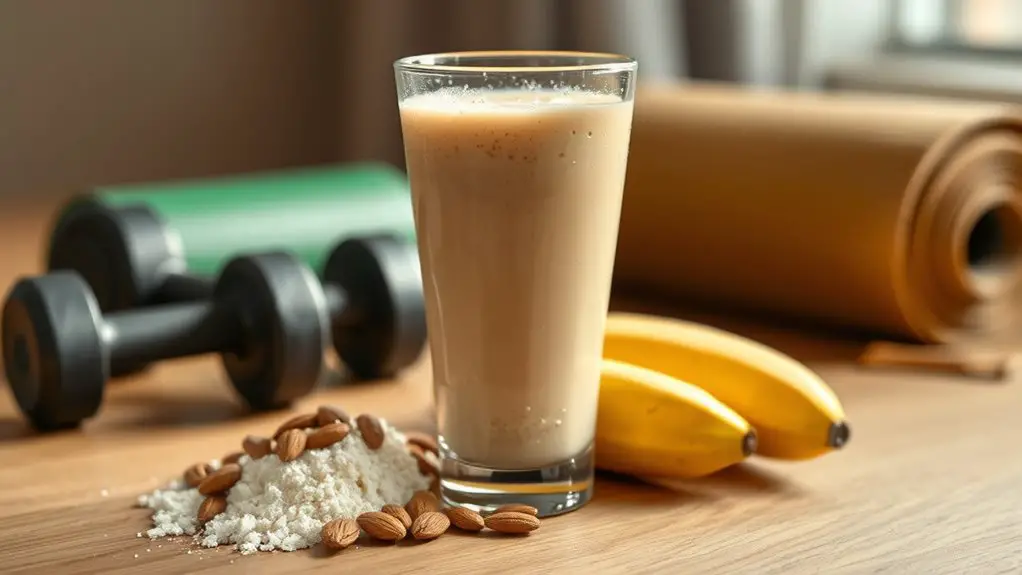How Protein Helps in Muscle Recovery

Protein is essential for muscle recovery as it repairs tiny tears in your muscle fibers caused by workouts. It reduces inflammation and supports growth, helping you recover faster. To optimize recovery, consume high-quality protein sources like lean meats, dairy, or plant-based options shortly after exercising. Pairing protein with carbohydrates also replenishes your energy stores. There are many insights about timing and nutrient combinations that can enhance your recovery even further.
The Role of Protein in Muscle Repair

When you push your muscles during a workout, tiny tears occur in the muscle fibers, and that’s where protein steps in to help. This essential nutrient plays an important role in repairing those tears, reducing muscle inflammation, and facilitating growth. Without adequate protein, your body struggles to recover efficiently, which can prolong your recovery timeline and lead to further discomfort.
To optimize your recovery, aim to consume a balanced protein source shortly after your workout. This not only helps in muscle repair but also aids in minimizing soreness. Remember, it’s important to listen to your body; if you feel excessive pain or prolonged fatigue, it could be a sign to adjust your routine. Ensuring you have enough protein in your diet can greatly support your recovery process, allowing you to get back to your workouts safely and effectively. Prioritize your health and make protein a key component of your recovery strategy.
Understanding Amino Acids and Their Functions
Amino acids are often called the building blocks of protein, and they play essential roles in muscle recovery and overall health. There are 20 different amino acid types, which can be categorized into essential and non-essential amino acids. Your body relies on these amino acids to facilitate protein synthesis, vital for repairing muscle tissue after workouts.
Here’s a table illustrating the importance of amino acids in recovery:
| Amino Acid Type | Function | Impact on Recovery |
|---|---|---|
| Essential | Supports muscle repair | Enhances recovery speed |
| Non-essential | Aids in protein synthesis | Maintains muscle function |
| Branched-chain | Reduces muscle soreness | Improves workout performance |
Best Protein Sources for Muscle Recovery

When it comes to muscle recovery, you’ll want to think about the best protein sources available. Whether you prefer animal-based options like chicken and fish or plant-based choices such as lentils and quinoa, each type has its benefits. Timing your protein intake can also play a vital role in maximizing your recovery.
Animal-Based Protein Sources
Animal-based protein sources are often considered the gold standard for muscle recovery due to their complete amino acid profiles and high digestibility. Whey benefits are well-known; it’s quickly absorbed and rich in branched-chain amino acids, ideal for post-workout recovery. Beef protein also packs a punch, providing essential nutrients and helping to repair muscle tissue. Fish sources like salmon and tuna offer omega-3 fatty acids, which can reduce inflammation and support overall recovery. Finally, don’t overlook egg nutrition; eggs are loaded with proteins and vitamins that promote muscle health. Incorporating these animal-based proteins into your diet can enhance your recovery process, ensuring you feel your best after intense workouts.
Plant-Based Protein Options
While many people associate muscle recovery with animal-based proteins, plant-based options can also play an essential role in supporting your recovery journey. Incorporating soy protein, hemp protein, and pea protein into your diet offers high-quality amino acids that aid muscle repair. Quinoa protein and lentil protein are excellent choices too, packed with nutrients that promote healing. Adding chia seeds and nut proteins can boost your protein intake while providing healthy fats. Brown rice provides a complete amino acid profile when combined with legumes. For a convenient option, consider spirulina protein in your protein smoothies, which delivers a nutrient-dense punch. By embracing these plant-based sources, you can safely enhance your muscle recovery and overall well-being.
Timing for Protein Intake
To maximize muscle recovery, timing your protein intake is just as essential as the type of protein you consume. Consuming pre workout protein helps fuel your muscles, while post workout protein aids in repair and growth. Aim to have protein-rich meals within 30 minutes after your workout for ideal benefits.
| Protein Timing | Recommended Sources |
|---|---|
| Pre Workout Protein | Greek yogurt, protein smoothie |
| Post Workout Protein | Chicken, protein shake |
| Pre Workout Protein | Eggs, nut butter |
| Post Workout Protein | Quinoa, cottage cheese |
Timing Your Protein Intake for Optimal Results

Timing your protein intake can greatly impact your muscle recovery. To maximize benefits, aim to consume protein shortly after your workout, ideally within a 30 to 60-minute recovery window. This period is essential for muscle repair and growth, as your body is primed to absorb nutrients efficiently.
In addition to post-workout protein, consider the frequency of your protein intake throughout the day. Spreading your protein consumption across multiple meals can support continuous muscle recovery and help maintain a positive nitrogen balance. This means that instead of loading up on protein in one sitting, you’ll want to distribute it evenly.
For best results, aim for a balanced intake of protein during your recovery windows, both immediately after exercise and at regular intervals throughout the day. This approach can help you recover safely and effectively, ensuring your muscles get the support they need to grow stronger.
Combining Protein With Other Nutrients
When it comes to muscle recovery, combining protein with other nutrients can make a big difference. Carbohydrates can enhance protein’s effectiveness, while healthy fats and essential vitamins and minerals play vital roles too. Understanding how these nutrients work together can help you optimize your recovery process.
Synergy With Carbohydrates
Although protein plays an essential role in muscle recovery, its effectiveness can be greatly enhanced when combined with carbohydrates. When you consume protein alongside carbohydrates, you’re optimizing protein synthesis, which is vital for muscle repair. Carbohydrates help replenish glycogen stores, providing the energy needed for your body to recover and rebuild after workouts.
Timing matters, too. Consuming protein and carbohydrates together within 30 minutes post-exercise can appreciably improve recovery outcomes. This combination guarantees your muscles get the nutrients they need right when they’re most receptive, reducing soreness and enhancing overall performance. By being mindful of how you combine these nutrients, you can support your body’s recovery process safely and effectively.
Importance of Fats
While carbohydrates and protein are essential for muscle recovery, fats also play a significant role in supporting your overall nutritional balance. Incorporating healthy fats into your diet can help improve nutrient absorption and provide sustained energy for your workouts. Sources like avocados, nuts, seeds, and olive oil are excellent choices that can complement your protein intake. These fat sources not only enhance the flavor of your meals but also support hormone production, which is vital for recovery. Balancing your meals with protein, carbohydrates, and healthy fats guarantees you’re fueling your body adequately. Remember, it’s not just about protein alone; combining it with fats can optimize your recovery process and keep you feeling satisfied and energized.
Vitamins and Minerals Role
To optimize muscle recovery, it’s essential to combine protein with various vitamins and minerals that support overall health. Vitamins like C and E help reduce inflammation, while B vitamins play an important role in energy metabolism. Minerals such as magnesium and zinc aid in muscle repair and growth. It’s important to maintain mineral balance, as an excess or deficiency can hinder recovery. Additionally, certain vitamins enhance vitamin absorption, making your protein intake more effective. For instance, pairing vitamin C with iron-rich foods can improve iron absorption, crucial for oxygen transport in muscles. By ensuring you get a well-rounded intake of these nutrients, you’ll promote a safer and more efficient recovery process, maximizing your training efforts.
Common Myths About Protein and Muscle Recovery
What misconceptions do many people have about protein and muscle recovery? You might hear protein myths suggesting that more protein equals faster recovery, but that’s not always true. Your body can only utilize a certain amount at a time, so overloading won’t yield better results. Another common recovery misconception is that protein shakes are the only effective source of protein. In reality, whole foods like chicken, beans, and nuts provide valuable nutrients alongside protein.
Some also believe that protein intake right after a workout is essential for recovery. While timing can matter, the overall daily intake is more important. Finally, many think that all protein sources are created equal, but it’s crucial to choose high-quality options. Understanding these myths can help you make informed choices for safe and effective muscle recovery.
Frequently Asked Questions
How Much Protein Do I Need for Muscle Recovery?
You might need around 1.2 to 2.2 grams of protein per kilogram of body weight for muscle recovery, depending on your activity level. It’s important to focus on protein timing; consuming protein soon after workouts can enhance recovery. Consider varied protein sources like lean meats, dairy, legumes, and plant-based options to meet your needs safely. Always listen to your body and consult a professional if you’re unsure about your protein intake.
Can I Get Enough Protein From a Vegetarian Diet?
Yes, you can definitely get enough protein from a vegetarian diet! By incorporating various plant-based sources, you can find plenty of protein-rich foods. Options like beans, lentils, quinoa, tofu, and tempeh are excellent choices. Nuts and seeds also provide good amounts of protein. Just make sure you’re balancing your meals to include a variety of these foods, so you’re meeting your nutritional needs safely and effectively. It’s all about planning your diet wisely!
Does Protein Powder Work Better Than Whole Food Sources?
When pondering protein’s potency, you might wonder if powders surpass whole foods. While protein powders can provide quick protein digestion and absorption, whole food sources often offer a more balanced nutrient profile. Whole foods deliver vitamins, minerals, and fiber, promoting overall health and safety. So, if you’re seeking sustained energy and wellness, you may prefer whole foods, but protein powders can be convenient when you need a speedy supplement after workouts.
What Happens if I Consume Too Much Protein?
If you consume too much protein, your body might struggle with protein digestion, leading to discomfort, bloating, or digestive issues. Excess protein can also put stress on your kidneys, especially if you have pre-existing conditions. It’s important to balance your protein sources and stick to recommended intake levels. While protein is essential, moderation is key for your overall health and safety. Always consult a healthcare professional if you have concerns about your diet.
Are There Side Effects of High Protein Intake?
Imagine your body as a high-performance engine; too much fuel can cause problems. If you’re consuming excessive protein sources, you might experience side effects like dehydration, digestive issues, or even strain on your kidney health. It’s essential to balance your intake, as overdoing it can lead to long-term complications. Always consider moderation and consult with a healthcare provider to guarantee you’re fueling your body safely and effectively. Your health’s worth it!





